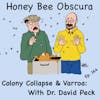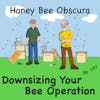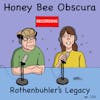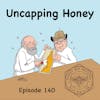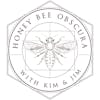Honey Bees and Native Bees (149)

In this episode, Jim, is joined by guest, Eugene Makovec, the editor of The American Bee Journal, to dissect the emotionally charged debate that's capturing the attention of beekeepers everywhere: Do honey bees harm native bees? This intriguing...
In this episode, Jim, is joined by guest, Eugene Makovec, the editor of The American Bee Journal, to dissect the emotionally charged debate that's capturing the attention of beekeepers everywhere: Do honey bees harm native bees? This intriguing question unfolds as a complex ecological issue, lacking a clear-cut victor or vanquished party. The verdict depends on a multitude of factors, including the context, location, and intricate dynamics of ecosystems. Recent research underscores the importance of recognizing that outcomes can differ significantly based on specific regions and circumstances.
Once considered saviors of pollination, honey bees now find themselves under scrutiny by certain conservation groups, labeled as 'invasive' and potentially 'harmful' to native pollinators. This shift in perspective has even led some to view beekeepers as unintentional contributors to this challenge.
During the episode, Jim and Eugene provide their invaluable insights, rooted in their extensive experience and expertise, allowing our listeners to navigate through the complexity of this issue. Join us as we work together to decipher the nuances and separate fact from the surrounding noise.
Join the discussion by sending us your questions and comments here!
______________________

Thanks to Betterbee for sponsoring today's episode. Betterbee’s mission is to support every beekeeper with excellent customer service, continued education and quality equipment. From their colorful and informative catalog to their support of beekeeper educational activities, including this podcast series, Betterbee truly is Beekeepers Serving Beekeepers. See for yourself at www.betterbee.com
______________________
Honey Bee Obscura is brought to you by Growing Planet Media, LLC, the home of Beekeeping Today Podcast.
Music: Heart & Soul by Gyom, All We Know by Midway Music, original guitar music by Jeffrey Ott
Cartoons by: John Martin (Beezwax Comics)
Copyright © 2023 by Growing Planet Media, LLC

Episode 149 – Honey Bees and Native Bees
[music]
Jim Tew: Listeners is fall of the year here in Northeast Ohio, I’m trying to get the bees ready for yet another winter so they can start the whole system again next spring. Something we don't talk about often but I'd like to bring up, this is as good a place as any. The bees that we don't think about a lot are also making their own preparations for the winter. There's all of these species of native bees out there living their solitary lives trying to get by, get enough food but I know our first love, mine and yours, is honey bees.
Eugene Makovec is with me here today and if you would bear with us, be patient, Eugene and I would like to talk about this interaction of native bees, honey bees, good, bad, some of the discussion that's gone on. Euguene, are you okay with that kind of thing?
Eugene Makovec: I think that sounds great. This is one of my favorite topics actually.
Jim: I want to thank you for being here and I know you had a lot else you could be doing with the magazine that you publish. Let's talk about it for a while. Hi, I'm Jim Tew.
Eugene: I’m Eugene Makovec from the American Bee Journal.
Jim: We'd love to talk with you for a few minutes about this whole neighborhood of bees and honey bees and other bees.
Introduction: You are listening to Honey Bee Obscura brought to you by Growing Planet Media the folks behind Beekeeping Today Podcast. Each week on Honey Bee Obscura hosts Kim Flottum and Jim Tew explore the complexities, the beauty, the fun, and the challenges of managing honeybees in today's world. Get ready for an engaging discussion to delight and inform all beekeepers. If you're a longtime or are just starting out, sit back and enjoy the next several minutes as Kim and Jim explore all things honeybees.
Jim: Eugene, you know when I started this whole bee thing, been decades ago, I was just crazy for bees, honey bees, and I was a farm boy, I'd been stung hundreds of times by wasps and bumbles and yellow jackets, not put those in a different category but from a bee and pollination standpoint, they're all on the same team.
Eugene: Yes, they are. I was a farm boy too and I know that I got stung hundreds of times but I think any kid who spends a decent amount of time in the outdoors is eventually going to get stung by something and it's always an unpleasant experience which is why they sting you. It's something that you just know is going to happen. Now with honey bees, my dad had bees and I can tell you that was a half dozen hives of bees in the yard. I only got stung one time by a honeybee growing up and that was when I was running barefoot across the grass and stepped on one on a dandelion or clover or something.
Jim: Well, at least you took the time to designate, I just ran and screamed. I didn't take time to key out the insect.
Eugene: Well, it left a sting.
Jim: Well, I didn't take time to look I'm telling you the truth but anytime I was stung by a bee in South Alabama, my first thought was a rattlesnake. I've just taken a poisonous snake bite and because of the absolute shock, I didn't see it coming. We've gone straight to the sting, I guess that's the thing that we all worry about or think about or we're known for is this sting thing but in reality, is honey too so much as stinging because as a young honey beekeeper, my first and foremost thought was getting honey so I could really be a honey magnate and make a product for myself.
I still want honey but as the years have passed, pollination has become more and more important and these native bees do an excellent job of that. If pollination is your thing, then I suppose one should look at the whole concert of possible pollinating agents.
Eugene: Yes, we talked about getting into bees and being gung-ho about honey bees. When I started doing this and I started giving the occasional talk to garden clubs and community groups and things, one of the things that I would tell them is, "Hey, if you want to grow a successful garden, you probably want to have a hive of honeybees there somewhere or have a neighbor who's got some in order to get your pollination properly done." I believed that sincerely for a while because at the time I lived in the St. Louis suburbs, I didn't have a place for a garden and that was as much as I knew about it.
When I moved out here into rural Missouri, about a dozen years ago, and got a little piece of ground, and started raising a big garden, I discovered that my half dozen colonies of bees with hundreds of thousands of foragers going out and about, they're outnumbered in my yard by all the natives. I walk around looking for bees to photograph on the flowers in my garden and in along the ditches and things and I'm seeing more of the native bees than I am the honeybees. They go out and go who knows where.
They're looking for the bigger bang for the buck and all these neighborhood native bees just spring out of the ground or wherever they live and they get the job done. I walked through the garden and I'm seeing all kinds of bumbles and carpenter bees, I've got squash bees on the squash and sunflower bees on the sunflowers and everything in between the masons and the mining bees and all these little sweat bees, especially my favorite are those little metallic green ones, really, really cool things and I don't know what most of them are even called. I just know that they're there and they're doing the job and it's great that my bees are out there helping them but they really are all in this together.
Jim: For any of the listeners who really are native bee people, I want to be very careful here. I want to say the right thing and do the right thing. I've never wanted harm to come to any of these species of any elk. I have to freely admit that I've always been a honeybee person but I don't know these bees either. They're mysterious. Just like you said, they come out of the ground, they come out of plant tissue, they come out of the wall of my shop. You can't really go to a native bee tree the way you can a honey bee nest. You don't see wired boxes. 25, 30 years ago, I began to enjoy the whole native bee thing more and more and I made nest boxes and took pieces of firewood and I was like a human termite, drilling holes and firewood and putting it under the eaves of the building here on [I'm in 00:06:55] , native bees were all over it. That worked out well.
Eugene: That’s me. I tried that one time with an old piece of dead wood and maybe it was too soft and partially rotten or something and I didn't have those results with it. You talk about the sting as the first thing that we think about with these things that I'm a little surprised-- when I think about it, I'm most surprised that I ever took up beekeeping given that I had a horrible episode in the second grade with a bumblebee. I grew up on a farm, like I said. My dad and older brothers were out in the yard on a Sunday afternoon sawing up some old lumber, had an old bandsaw that was hooked to the flywheel on an old farm old tractor and sawing up lumber.
I was seven years old, I wasn't a lot of help, not that I was much help when I was older but at one point I'd picked up the end of a big board, and out came a bumblebee and just attacked me. I just remember screaming and flailing and I wound up killing it on the back of my neck but I woke up Monday morning and my eyes were glued shut, I couldn't go to school but about noon, I guess, I could see again and my mom carted me off to school and some of my classmates didn't recognize me. They thought I was the new kid. I was completely swelled up and unrecognizable. It was not a life-threatening experience but it certainly stayed with me.
I carried an undying enmity for bumblebees with me well into adulthood and when I was living in St. Louis County, had a house, this was in probably my early 30s, outside our side door we had a stand of hostas, and if you know hostas they grow probably 3 feet tall or something. They're kind of droopy, they’re basically a ground cover where they have these long, droopy purple lavender flowers that lean down.
I noticed one day that the bumblebees would crawl up into that flower to access whatever pollen and nectar they were getting my vengeful mind started thinking and I would stand there and I would wait while that bumblebee would climb up on that flower and I would clap my hands together and destroy that bumblebee and the flower and all. I’ll give a little evil laugh and I’d wait for the next unsuspecting bee to come along.
It was horrible, absolutely horrible. Maybe a couple of years after that, not too long, after that, I took up beekeeping and the more I read and researched these things, the more I developed an appreciation for bumblebees. Not only that, but I came to know that those poor fuzzy creatures that I'd been murdering outside my door were actually carpenter bees which made me feel even worse about the whole incident.
To this day I'm still doing penance by singing the praises of both bumbles and carpenters. Every time I talk to any group of people or anytime someone comes out and starts dissing these things, I rush to their defense and talk about what great pollinators there are and everything like that. We grow. We like to think we grow.
Jim: We do grow. You're exactly right. I do the best I can to defend carpenter bees, even though I'm watching them chew up some of the facial boards on my outbuildings. Early on, I tried to control my stars. They're going to just bore everything and destroy the building. I tried to go out and control them. You can't move them. Eugene, after about three to four years, I just gave up. It's easier to replace that board than it is to go out and try and control those nests and do all the things that you're told to do with steel wool and caulking material.
You see them on flowers, just like you said. You end up trying to say, in most cases, they won't destroy the whole building and if they do take out a board, it's not the end of the world to replace it once every 10 or 12 years. You're going to replace something anyway. It's just all part of life. I admit it that you and I probably aren't the best people to sing the praises of these alternative species, but I have grown to be much more appreciative of them. Eugene, let's take a break here and hear from the people who pay our bills.
Betterbee: Are you ready to savor the sweet rewards of beekeeping? Look no further. Betterbee is proud to offer honey extraction and processing equipment, brought to you by the renowned Lyson. Lyson is a global leader known for their impeccable craftsmanship and cutting-edge designs. Unlike other options, Lyson extractors boast unrivaled durability and are certified food grade, making them safe for health and the environment plus the rust-resistant stainless steel is a breeze to clean, promising an extended service life. From 4-frame to 56-frame extractors, we've got you covered. Visit betterbee.com/extract to explore our wide range of options.
Jim: Listeners, I'm talking with Eugene Makovec from the American Bee Journal. The editor there. He's at the crossroads of the information flow. We've talked for a few minutes more about the whole concept of native bees and how they interact with honey bees. As the editor, what comes across your desk? There for a while, about several months ago, there was an article indicating how greedy honey bees were and how much of the ecosystem's resources they took. Did you get any feedback from that from bee people, from native bee people or?
Eugene: Not a whole lot from readers. I think that's something that's out there. It's amazing to me the way that honey bees and beekeepers have been treated, for lack of a better word, in the media and popular culture. For a long time, we were basically just ignored. If you told somebody you were a beekeeper, they'd look at you funny and wonder how in the heck you got into that line of business. When the whole thing came along with colony collapse disorder and everything, everything went crazy in the media.
Suddenly we were so much better appreciated, both the beekeepers and the bees. Everybody was singing the praises of honey bees and talking about how horrible it was that they were on the verge of extinction and all these crazy things. We really pushed it to the extreme. Now it seems like within the last year or two, they're heading back in the other direction where you have some of the native bee groups and some of the environmental groups talking about, well, honey bees are actually an invasive species.
Certainly, at a minimum, they're not native to the United States, but some actually consider them an invasive species and they're crowding out the natives and things like that. I don't know how long it'll be before the pendulum starts swinging back again. I really think on this subject, I think there's no clear science here. It's not an exact science.
There's some studies that suggest that in some situations honey bees can crowd out natives. There was one that was done in, I believe it was the Canary Islands, which is obviously not a typical scenario. There have been others that suggest that honey bees in an area actually increase the floor of available pollenation, adding additional pollination. You add more pollination, more plants grow, and that old rising tide lift all boats theory. I don't know.
Jim: One of the main things I don't know is when I walked just a few-- right now it's pretty much past its peak, but just two weeks ago, these fall flowers were just everywhere and smell of golden rod honey coming from our apiary. When I would take a walk, even though there was a lot of bee activity of all species, most flowers did not have an insect visitor on them. What does that mean? Is the reward of nectar and pollen so small on individual flowers that most flowers at any given time are not going to have a bee on them? I couldn't tell.
It looked to me like that there was plenty for everyone out there. That could be my bias toward honey bees, but there were flowers everywhere that had nothing on them.
Eugene: Of course has just the same bias. I think that's true. I think that in many, if not most areas, you're going to have more plant sources out there than you do have bees to work them. I see the same thing around here. I walk out and I see-- Like now I'm looking out at all the asters. I'm in eastern Missouri. I look at all the asters and things that are blooming now, and I see honey bees on them. I see bumblebees, I see some of these sweat bees and things, but by and large, I can walk across a swath of these flowers and have to look sometimes for 30 seconds before I find something on them. Not for lack of pollinators being around, but they're just more out there, I think, than they have.
Where the honey bees are concerned, I mentioned that I would walk around the yard and not see them for the most part. I can tell when some of the big, say the clover, some of the big sources that they're out there working are drying up, say mid-July or so. I can tell when that clover is basically done because suddenly I start seeing the honey bees around my yard working the various wildflowers, weeds that they were ignoring before. Now they're less picky.
Jim: It's a hard call. I want to be crystal clear. I support all bees doing their pollination work and keeping a balanced ecosystem but at times, it's just like you smashing carpenter bees in those plant blossoms you were talking about. At times, you just want to get snarky about it because I cannot keep those native bees from filling all of the orifices on my power washer with little nest. Every spring until I finally learned better, I had to spend an hour or so cleaning out all the bee nest out of the hose and the lines that were on my power washer. They take the caulking out of my shop where I caulked up all the holes and cracks.
They take that out to make their little nest site there. Part of me says, "Good job. I'm supporting the native bee industry." The other one of me says, "Well, that's going to let water in the wall of my shop, and over time that's going to cause some structural rot and paint issues. It's just the things that we don't talk about much. Sometimes these native bees can give me grief. Sometimes honey bees give me grief when they swarm and cluster in my neighbor's yard. I guess I'm saying, yes, I want pollination, yes, I want these populations healthy, but yes, at times these insects are just in the wrong place and I wish they weren't there.
Eugene: Where the carpenter bees are concerned, I had an old garage when I was there in that house that I talked about. We had an ancient garage that was-- it didn't even have a door that closed all the way. It was a habitat. We had-- mud daubers and residents in there and pretty good numbers and the carpenter bees were there nesting on some old wood that was unpainted, untreated, which is really the key most of the times is if you have your wood that's treated on a regular basis, they're not going to be drilling those holes.
I used to love just watching them there because I didn't care that much about the building. You could watch those things drill on those holes. You could hear them doing this [buzzing].
Jim: I hear that.
Eugene: And that sawdust come filtering down onto the ground. It was a pretty neat thing as they tunneled back in there. It's funny though, with those carpenters other than the damage to the wood in some cases, they're about the most harmless creatures imaginable. It's always funny when you hear people talk about being afraid of them. It's understandable because they're huge and they'll sit there and hover in front of your face. They're very curious. These are
the males that do this and they scare the heck out of people and I'll talk to groups and I'll start getting into the subject and I'll say, raise your hand if you ever chase these things around with a tennis racket. There's usually a couple of hands go up and, you know what, those are the male bees, they don't even have stingers. Now don't you feel foolish. It's just funny the things that we just automatically fear for no good reason in many cases.
Jim: We're out of time, but I want to say this, years ago there was an avid bee lover who didn't want to kill those males, so she would capture them and move them away and because of this propensity she had for loving bees, she would mark them and she said that if she didn't take them 10 to 15 miles away, they were back home before she was with their marks on their thorax. It was really an unintentional, interesting study that they did.
Eugene: I would not have dreamed that. A lot of these natives never go farther than a few hundred feet from home.
Jim: Yes, right. They usually stay close to home. W ould you agree, I think we agree, that I'm a honeybee person with all the bias that goes with that, I have to admit that, but at the same time I do have a meaningful respect for native bees and it sounds like you do too.
Eugene: Yes, very much so.
Jim: I want to keep on keeping my honeybees, but I want the native bee populations and all that diversity alive and well out there too. I enjoyed talking with you, I guess we need to shut it down and let you get back to editing and doing your real work. I enjoyed talking with you, I hope at some point you wouldn't mind doing it again on another topic just to stimulate you.
Eugene: I enjoyed it too, I appreciate your asking me.
Jim: I know you had other things to do and I'm always really reluctant to ask people, but thank you for doing it. Until we can talk again, I'll tell you and the listeners, goodbye.
Eugene: Goodbye.
[00:22:03] [END OF AUDIO]
New to Honey Bee Obscura Podcast?
Here are some great episodes to start with. Or, check out episodes by topic.







 In this episode, Jim, is joined by guest, Eugene Makovec, the editor of The American Bee Journal, to dissect the emotionally charged debate that's capturing the attention of beekeepers everywhere: Do honey bees harm native bees? This intriguing question unfolds as a complex ecological issue, lacking a clear-cut victor or vanquished party. The verdict depends on a multitude of factors, including the context, location, and intricate dynamics of ecosystems. Recent research underscores the importance of recognizing that outcomes can differ significantly based on specific regions and circumstances.
In this episode, Jim, is joined by guest, Eugene Makovec, the editor of The American Bee Journal, to dissect the emotionally charged debate that's capturing the attention of beekeepers everywhere: Do honey bees harm native bees? This intriguing question unfolds as a complex ecological issue, lacking a clear-cut victor or vanquished party. The verdict depends on a multitude of factors, including the context, location, and intricate dynamics of ecosystems. Recent research underscores the importance of recognizing that outcomes can differ significantly based on specific regions and circumstances.

